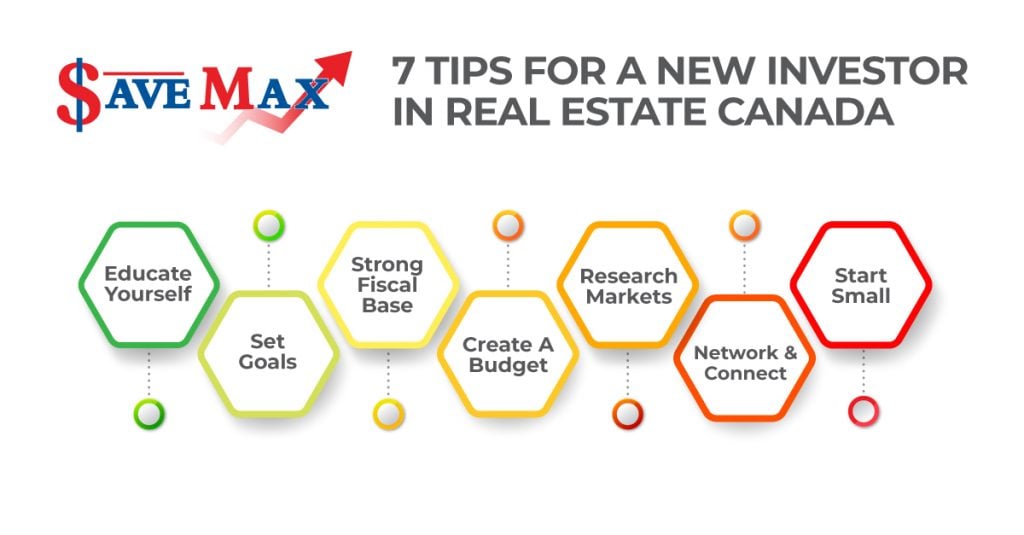The Beginner’s Blueprint: Your Trusted Guide for Investing in Real Estate Canada
Real Estate, one of the oldest and most reliable investment avenues, is a good choice for several reasons:
- It appreciates over time, allowing investors to build equity.
- Real estate offers a reliable income source through rentals.
- Property investments offer diversification, hedge against inflation, and provide tax advantages.

The stability, limited supply, and consistent demand make Real Estate Canada an attractive investment option.
While real estate investing has many advantages, you should carefully evaluate the risks before expanding your portfolio. Carefully consider your finances and goals, thoroughly research the market, and seek professional advice before making any decisions.
This blog provides a blueprint for beginners to help them understand the risks, options and potential income before investing.
Table of Content
- 1 Real Estate Investment Options
- 2 The Beginner’s Blueprint
- 3 Risks with Real Estate Investing
- 4 FAQs from Investment Novices
- 4.0.1 What are the advantages of investing in real estate in Canada?
- 4.0.2 How much money do I need to start investing in real estate in Canada?
- 4.0.3 Should I buy a residential or commercial property?
- 4.0.4 How can I finance my real estate investment in Canada?
- 4.0.5 What should I consider when choosing a location for real estate investment?
- 4.0.6 How can I find good real estate deals in Canada?
- 5 Stay connected
Real Estate Investment Options
Though buying commercial or residential investment properties for rental income is the most popular investment choice, there are other ways of investing in real estate in Canada. Here are some of the alternatives:
Real Estate Investment Trusts (REITs): Generally speaking, REITs are companies that own, manage, or finance income-generating properties such as malls, commercial spaces or apartments. Like a mutual fund, investors can buy shares and receive a proportionate share of the rental income and property appreciation.
REITs offer a more straightforward and effortless entry point for new investors with lower investments and diversified portfolios. They offer a relatively safe investment with a reduced risk of putting all funds into a single market or business during market downturns.
Real Estate Syndication, Crowdfunding and Partnerships: These are various forms of investing as a group rather than individually.
A syndicate of investors pool their funds to invest in larger properties or real estate development projects, allowing individual investors to avail opportunities beyond their financial reach.
You can invest through online platforms connecting investors with developers or sponsors. When crowdfunding, investors can contribute smaller funds to a specific project and receive returns based on its success.
Another option is forming partnerships or joint ventures with other investors to purchase and manage real estate properties. Partnerships provide shared financial resources, knowledge, and expertise, enabling investors to tackle larger projects or diversify their portfolios.
Real Estate Development: Invest in real estate development projects, such as land acquisition, construction, and property development. This option requires more capital and expertise but can offer higher returns.
Fix-and-Flip: Buying distressed properties at a discounted price, renovating or improving them, and then selling them at a higher price to generate profits.
Short-Term and Vacation Rentals: Renting out a part of your home to short-term lodgers or buying properties in tourist destinations and renting them out to vacationers through platforms like Airbnb or VRBO – this can be an easier way to start your real estate investment journey.
Consider your finances and appetite for risk before choosing one or more of these options for investing.
The Beginner’s Blueprint
Before you actually invest your money, you need to invest your time and effort in understanding the benefits and drawbacks of investing in real estate. We have some strategic tips for new investors looking to start their investing journey in real estate in Canada:

Educate Yourself:
Begin by researching and acquiring knowledge about real estate investments. Read books, attend seminars by industry experts, listen to podcasts, and follow reputable real estate investment websites and blogs. Understand the basics of real estate investing, different investment strategies, market trends, financing options, and legal considerations specific to Canada. The more information you have, the better prepared you will be for the topsy-turvy investing world.
Set Clear Goals:
Define your investment goals as clearly as possible. Determine what you aim to achieve through investments – whether it is generating passive income, long-term wealth accumulation, or portfolio diversification. Setting clear goals will help you plan timelines and finances, focus your efforts and make informed decisions.
Build a Strong Financial Foundation:
Assess your financial situation. Consult a professional to help establish a solid foundation for real estate investment if needed. Pay off any high-interest debts, improve your credit score and build an emergency fund. Real estate investment requires ready capital, so it’s important to have a stable financial position before starting.
Create a Realistic Budget:
Once you have a fair idea of your goals and finances, draw up a budget for your available funds for investing in real estate. Consider your savings, potential financing options, and the amount you’re comfortable allocating for property purchases, renovations, and ongoing expenses. Stick firmly to your budget to avoid overextending yourself and landing in trouble.
Research Local Real Estate Markets:
Once the budget is finalized, narrow down the locations where you want to start investing and thoroughly research the local real estate markets in those areas. Analyze market trends, supply and demand dynamics, rental rates, vacancy rates, and future development plans. Initially, we recommend that you focus on areas that align with your investment goals and show potential for growth and profitability.
Network and Build Connections:
Establish a network within the real estate community. Start building connections when attending events, join real estate investment groups, and connect with experienced investors, agents, lenders, and other professionals. Ensure that you are up-to-date with what’s happening in the industry. Networking can provide valuable insights, partnerships, and opportunities.
Start Small and Learn:
Start small, and build your portfolio as you grow. Consider options such as purchasing a rental property, investing in REITs, or participating in crowdfunding platforms. Gain hands-on experience, learn from each investment, and gradually expand your portfolio as you gain confidence and expertise.
Remember, real estate investment requires patience, diligence, and continuous learning. Stay informed, adapt to market conditions, and seek professional advice if needed. With time and experience, you can grow your real estate investment portfolio and work towards achieving your financial goals.
Risks with Real Estate Investing
Like all investments, real estate investing comes with risks. Although prices historically rise over time, market dynamics, such as supply and demand, interest rates, and changing demographics, can significantly impact property values.
Extensive financial analysis may not be essential, but market fluctuations, property vacancies, maintenance costs, insurance, and mortgages are challenges that you may face. Unlike stocks, real estate is difficult to liquidate and requires investors to actively find buyers, negotiate prices, and complete the sale. Additionally, buying properties requires significant funds and access to credit, making it a serious financial commitment.
Managing and maintaining properties, or flipping homes, is a full-time job. Hiring a property manager, seasonal maintenance and necessary repairs can add to the costs, requiring available funds. Be prepared for the potential pitfalls involved in real estate investment. Thorough research, financial preparedness, and a realistic market understanding are crucial before starting your investment journey.

FAQs from Investment Novices
Here are some frequently asked questions that beginners to investing in real estate in Canada ask:
What are the advantages of investing in real estate in Canada?
Real estate investment offers several advantages: potential long-term appreciation, steady cash flow from rental income, tax benefits, and a diversified investment portfolio.
How much money do I need to start investing in real estate in Canada?
The amount you need to start investing in real estate in Canada varies depending on various factors, such as location, property type, and investment goals. Generally, you will need a down payment, closing costs, and property maintenance and management funds. Use the Save Max Mortgage Calculator to help you plan your cash flow. If you prefer to start small, you can invest in REITs, where lesser investment amounts are the norm.
Should I buy a residential or commercial property?
Investing in residential or commercial property depends on your investment goals, budget and risk tolerance. Residential properties are more common for novice investors as they are considered easier to manage. Commercial properties may offer higher returns but often require more capital and experience.
How can I finance my real estate investment in Canada?
Financing options for real estate investments in Canada include traditional mortgages, private lenders, partnerships, or using your own funds. Explore different financing options, compare interest rates, and consider your financial situation and investment goals.
What should I consider when choosing a location for real estate investment?
When selecting a location, consider economic growth, population trends, employment opportunities, amenities, and proximity to transportation and schools. Researching local market trends and consulting with an expert real estate agent can help you buy the best investment properties.
How can I find good real estate deals in Canada?
To find good real estate deals, you can work with agents, build networks, connect with local investors, attend open houses and auctions, browse online listings, and explore off-market opportunities to find good real estate deals. Always conduct thorough due diligence and analysis to identify profitable investment opportunities.
Stay connected
This article is the fifth in a series of Trusted Guides to Real Estate Canada that Save Max offers real estate enthusiasts. You can access the first one here. Additionally, check out the other informative blogs in our collection, covering real estate trends and industry updates.
Stay with us as we bring you the latest updates and valuable insights on real estate in Canada. Our team is always here if you have any questions or need assistance. Stay in touch, and let us help you navigate the world of real estate in Canada.
